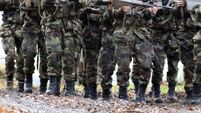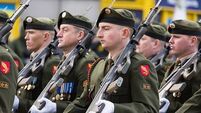Out-of-date rules hampering Reserve Defence Forces

100-day cap on operational service prevents reservists from undertaking an overseas tour. Picture: Leah Farrell / RollingNews.ie
Recruiting and retaining members of the Reserve Defence Forces (RDF) is being hampered by archaic rules long since abolished by other militaries, representatives for serving personnel have said.
Among the issues is an anomaly that prevents them from serving overseas, even though this was supposed to be allowed as a result of an act introduced two years ago.













